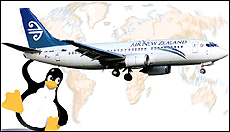
As I used to work for Ansett before and using Lotus Notes , I thought MS Outlook was abit of a backward step , does anyone know much about Linux ??? the article in the Paper follows.....Air NZ cuts costs with Linux
13.08.2002
By ADAM GIFFORD
The penguin may be flightless, but the Linux mascot has become the bird of choice at Air New Zealand, leaving Microsoft grounded.
As part of a deal with IBM that was renewed last week, Air New Zealand is replacing the 150 Compaq servers it uses for email and file and print serving with IBM Z800 mainframes running the Linux operating system Websphere Application Server, DB2 Database, and Tivoli software.
This means the airline can replace 4000 Microsoft Exchange email and file and print clients with Bynari, an open source email application.
Going on the latest Microsoft Software Assurance model, that could mean a saving of $600,000 a year in licence fees alone, although the price large customers pay Microsoft is usually a tightly guarded secret.
Air New Zealand spokesman Cameron Hill said the airline believed Linux "has come of age in its ability to be used by major IT users".
He said Linux was being used to reduce costs.
"We wouldn't do it otherwise."
Air New Zealand has refused to say how much the IBM deal is worth or discuss its term, but the typical way such arrangements now work is that the supplier steadily reduces costs and shares the savings with the customer.
Bob Morton, IBM's northern region manager, said as part of the contract "we will take Air New Zealand through a migration programme to put several applications on Linux on the mainframe".
He said this should reduce the total cost of the ownership. As IBM continued to own the hardware it deployed, this would benefit both parties.
It is using two mainframes, one for disaster recovery and system redundancy.
Morton said mainframe computing was starting to look more attractive for many large organisations as the cost of running them fell.
"The true cost of managing distributed environments is large, and most organisations are looking to rationalise and simplify their environment. For a lot, that means consolidating their servers and centralising."
He said Air New Zealand's acceptance of Linux should accelerate interest in the New Zealand market.
While IBM's original 1997 agreement with Air New Zealand covered mainframe maintenance, over the course of the deal it extended it to midrange servers and other web and Linux services.
In replacing the email servers IBM is moving in work done by Gen-i, which also has a contract with the airline.
Gen-i managing director Garth Biggs refused to comment on the implications of the move. "Air New Zealand is still a very valuable customer for us," Biggs said.
Roger DeSalis of the New Zealand Network Operators Group said the next NZNOG conference would include a technical session on Linux on the mainframe.
"The mainframe can be used for a significantly more effective web server because the mainframe has proper I/O [Input/Output], and the web world is all about I/O.
"With Air New Zealand moving as much of its activity as it can online, which it is signalling through things like its attempt to reduce its dependence on travel agents, it needs serious web capability," DeSalis said.
He said Linux did not run native on mainframes, but could run in partitions running on top of the MVS mainframe operating system.
"It is significantly cheaper than having lots of MVS licences."
DeSalis said other New Zealand companies were likely to follow Air New Zealand's lead and increase their use of Linux, particularly as technical people familiar with it were promoted to positions of authority.
"The maturity level and quality of the software is stunning. The latest Debian 3.0 distribution which came out a couple of weeks ago came on seven CDs and includes more than 3000 software packages, all stable and tested."
IBM is trumpeting the Air New Zealand move at this week's LinuxWorld conference in San Francisco.
"It is significant that customers of every size and from every industry are turning to IBM, our business partners, and Linux for mission critical applications and total Linux solutions," said Steve Solazzo, IBM's general manager for Linux.
"The overwhelming trend toward Linux throughout the business world validates IBM's decision over two years ago to embrace Linux and is further evidence of Linux's compelling value proposition."
As well as Air New Zealand, it said, Deutsche Telekom's T-Com Internet division had consolidated Unix service applications previously running on 25 Sun servers on to an IBM eServer zSeries mainframe running Linux.
The applications included mail, intranet sites and mail back-up services for internal and external customers.
Another key customer was Australian Government social services delivery agency Centrelink, which had signed a four-year partnership agreement with IBM to provide mainframe capacity.

 Home
Home
 Products
Products
 Store
Store
 Forum
Forum
 Warehouse
Warehouse
 Contact Us
Contact Us




 Printer-friendly view of this topic
Printer-friendly view of this topic















